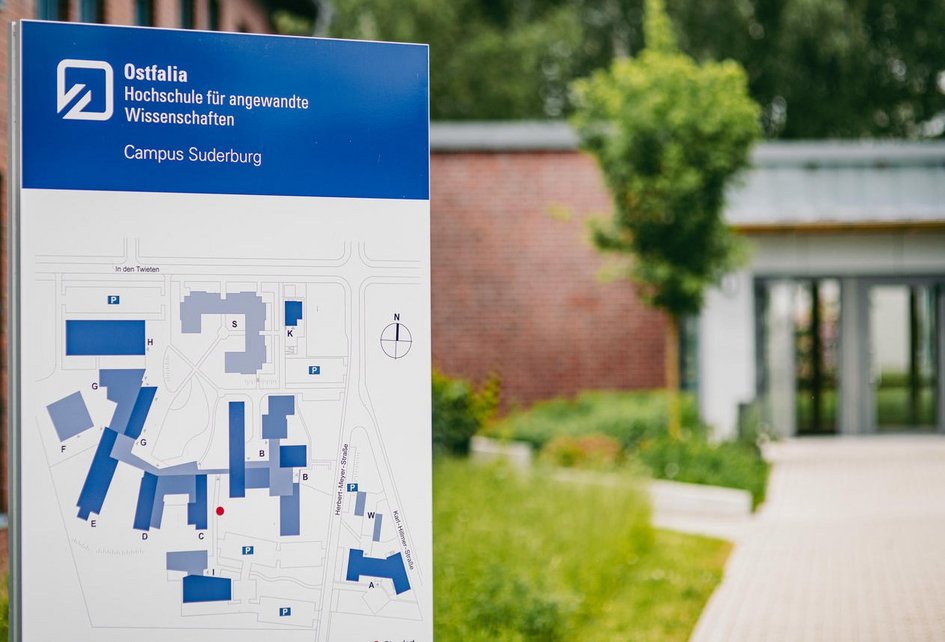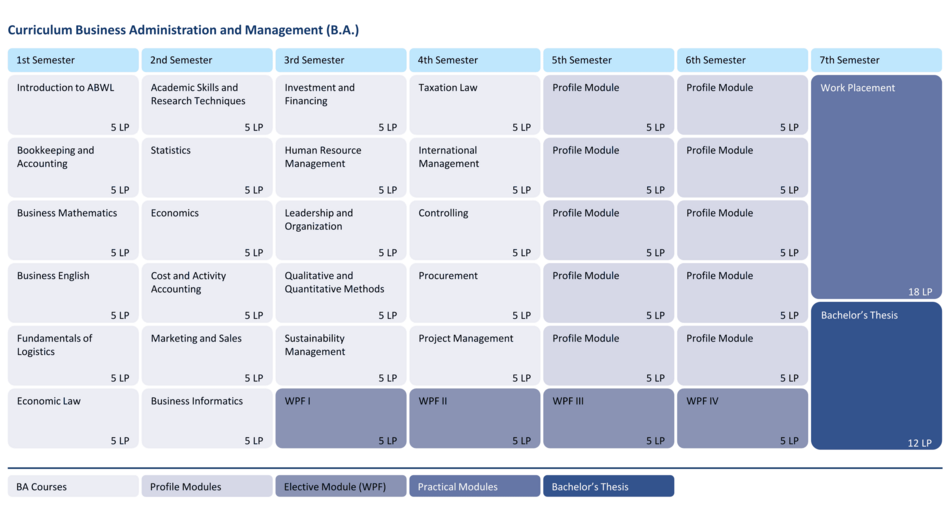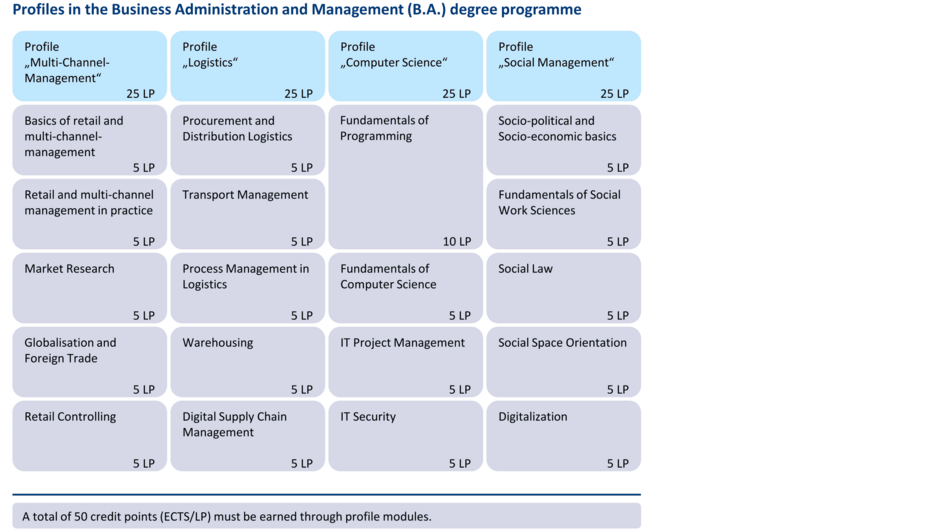Business Administration and Management
Would you like to understand how our economy works and gain practical insights into how to make processes efficient and sustainable?
With us, you will acquire a solid foundation in business administration for various specialist and management roles. You can choose a profile and specialise in a specific area - or flexibly combine the content of several areas. The integrated practical phase allows you to apply your business knowledge directly in the company. This prepares you for your career entry in a targeted manner.
Facts at a glance
Think globally. Study locally.
The best opportunities for your future. Choose Business Administration and Management at Campus Suderburg!
To the application!Details of the degree programme
Fields of activity
Programme content
At the Suderburg campus, you will deal with economic issues and management topics - in a practical and academically sound manner. You will develop the skills you need to make informed decisions and take on responsibility later on. Theory and practice are closely linked in the degree programme.
For example, you will learn
- How to make and analyse business decisions
- How accounting, controlling and financing work together
- How to analyse markets and develop marketing strategies
- How to plan and manage personnel processes
You choose two business administration profiles for your personal focus during your studies and specialise in a specific area. Alternatively, you can combine a profile with other modules or put together your own content according to your interests.
Practical learning
Practical learning


Our modern laboratories at the Suderburg campus offer you many opportunities to learn in a practical way and gain your own experience. In the laboratory for experimental and empirical market and management research and in the logistics laboratory, you will apply business management methods in practice - from market research to process optimisation. This allows you to bring theory and practice together in a targeted manner.
After the Bachelor
After completing your Bachelor's degree, you will have access to various Master's degree programmes at Ostfalia as well as at other colleges or universities. As the degree is internationally recognised, you also have the opportunity to do a Master's degree outside of Germany. You can find out about suitable Master's degree programmes at Ostfalia here:
Master's programmes at the Ostfalia
Study programme
In semesters 1 to 4, you will learn all the basics of business administration.
In the 5th and 6th semesters, you can choose freely according to your interests:
- You choose two profiles
- You choose one profile and 5 additional modules
- You are free to choose 10 modules according to your interests
You can choose from a total of four different profiles: Multi-Channel Management, Logistics, Social Management and Sports Management. Each of these profiles comprises four or five thematically related modules that provide you with in-depth knowledge in the respective area.
In the 7th semester, you will enter the practical phase and then complete your studies with the Bachelor's thesis and colloquium.
1. Semester
Introduction to ABWL (1. Semester) The module teaches the essential aspects of business administration along the operational functions and deals with the following basic topics:
- Business administration as a science
- Subject matter, concepts and fundamentals of business administration
- Companies and corporate management
- Marketing
- Procurement
- Production
- Accounting and controlling
- Investment and financing
- Organisation and personnel
The module teaches the essential aspects of business administration along the operational functions and deals with the following basic topics:
- Business administration as a science
- Subject matter, concepts and fundamentals of business administration
- Companies and corporate management
- Marketing
- Procurement
- Production
- Accounting and controlling
- Investment and financing
- Organisation and personnel
Bookkeeping and Accounting (1. Semester) The course focuses on the following topics:
- Accounting basics
- Systematics of accounting
- Postings in the important functional areas of a company
- Preparation of a balance sheet and a profit and loss account and closing entries
- Annual financial statements with balance sheet analysis
The course focuses on the following topics:
- Accounting basics
- Systematics of accounting
- Postings in the important functional areas of a company
- Preparation of a balance sheet and a profit and loss account and closing entries
- Annual financial statements with balance sheet analysis
Business Mathematics (1. Semester) - Introduction to logic
- Set theory and numbers,
- Equations and inequalities,
- Sums and products,
- linear systems of equations and linear optimisation,
- Relations and functions, properties and graphs,
- Sequences and series,
- simple interest, annuity and amortisation calculations
- simple differential and integral calculus,
- non-linear optimisation
- numerical methods from the various teaching contents described above
- Introduction to logic
- Set theory and numbers,
- Equations and inequalities,
- Sums and products,
- linear systems of equations and linear optimisation,
- Relations and functions, properties and graphs,
- Sequences and series,
- simple interest, annuity and amortisation calculations
- simple differential and integral calculus,
- non-linear optimisation
- numerical methods from the various teaching contents described above
Business English (1. Semester) The content of this module is divided into two areas. Firstly, the specific topics and specialised vocabulary of the business world and secondly, the basic language skills. Each subject area looks at typical business vocabulary, phrases and idioms. Certain subject areas are particularly suitable for practising the grammatical facets of the language. The teaching of the two sections can be combined in this way and the language level is improved from chapter to chapter.
The content of this module is divided into two areas. Firstly, the specific topics and specialised vocabulary of the business world and secondly, the basic language skills. Each subject area looks at typical business vocabulary, phrases and idioms. Certain subject areas are particularly suitable for practising the grammatical facets of the language. The teaching of the two sections can be combined in this way and the language level is improved from chapter to chapter.
Fundamentals of Logistics (1. Semester) Students are taught various fundamental aspects of logistics. The course focuses on the following topics:
- Fundamentals of logistics: the concept of logistics and its development, business fundamentals of logistics
- Order processing
- Transport, handling and storage systems
- Logistical subsystems and processes: Procurement, production and distribution logistics
- Fundamentals of logistics services
- Supply chain management
- Logistics and the environment
- Logistics and IT
Students are taught various fundamental aspects of logistics. The course focuses on the following topics:
- Fundamentals of logistics: the concept of logistics and its development, business fundamentals of logistics
- Order processing
- Transport, handling and storage systems
- Logistical subsystems and processes: Procurement, production and distribution logistics
- Fundamentals of logistics services
- Supply chain management
- Logistics and the environment
- Logistics and IT
Economic Law (1. Semester) - Introduction to law: brief legal history, laws, areas of law, court system, European law
- Persons: natural persons, legal entities, representation
- Merchants: merchant characteristics, commercial register, company principles, excursus on company law
- Property law: objects (physical, non-physical), possession, ownership, other rights
- Legal transactions (RG): unilateral RG, multilateral RG, formation, disruptions, contracts, obligatory and disposable transactions, grounds for nullity, avoidance, contractual ancillary provisions and general terms and conditions
- Statutory obligations
- Excursus: Competition law
- Excursus: Patent law
- Excursus: Trade mark law
- Excursus: Copyright law
- Introduction to law: brief legal history, laws, areas of law, court system, European law
- Persons: natural persons, legal entities, representation
- Merchants: merchant characteristics, commercial register, company principles, excursus on company law
- Property law: objects (physical, non-physical), possession, ownership, other rights
- Legal transactions (RG): unilateral RG, multilateral RG, formation, disruptions, contracts, obligatory and disposable transactions, grounds for nullity, avoidance, contractual ancillary provisions and general terms and conditions
- Statutory obligations
- Excursus: Competition law
- Excursus: Patent law
- Excursus: Trade mark law
- Excursus: Copyright law
Location advantages Campus Suderburg

+ Modern equipment
+ Small groups
+ Intensive support
+ Familiar contact
+ Short distances
+ Active student life with parties, cinema, sports
+ Favourable living space
+ Lots of nature
+ Quickly in Hamburg or Hanover with the semester ticket and the train
Useful links and files
Do you still have questions?
Our Central Student Advisory Service (ZSB) will be happy to support you!
Building Am Exer 45, Room 101 -105
availability by phone:
Monday, Tuesday and Wednesday: 9:00 AM - 3:30 PM
Thursday: 1:00 PM - 3:30 PM
Friday and before holidays: 9:00 AM - 12:00 PM



